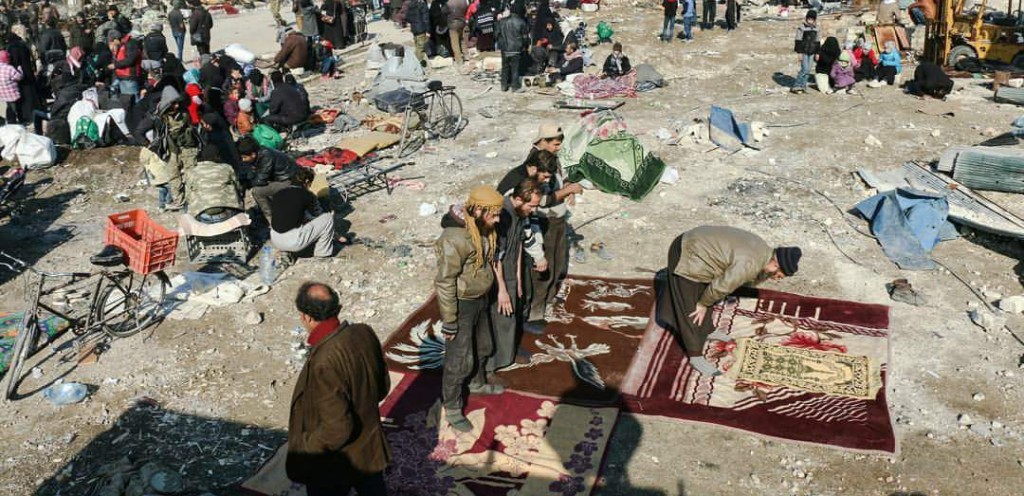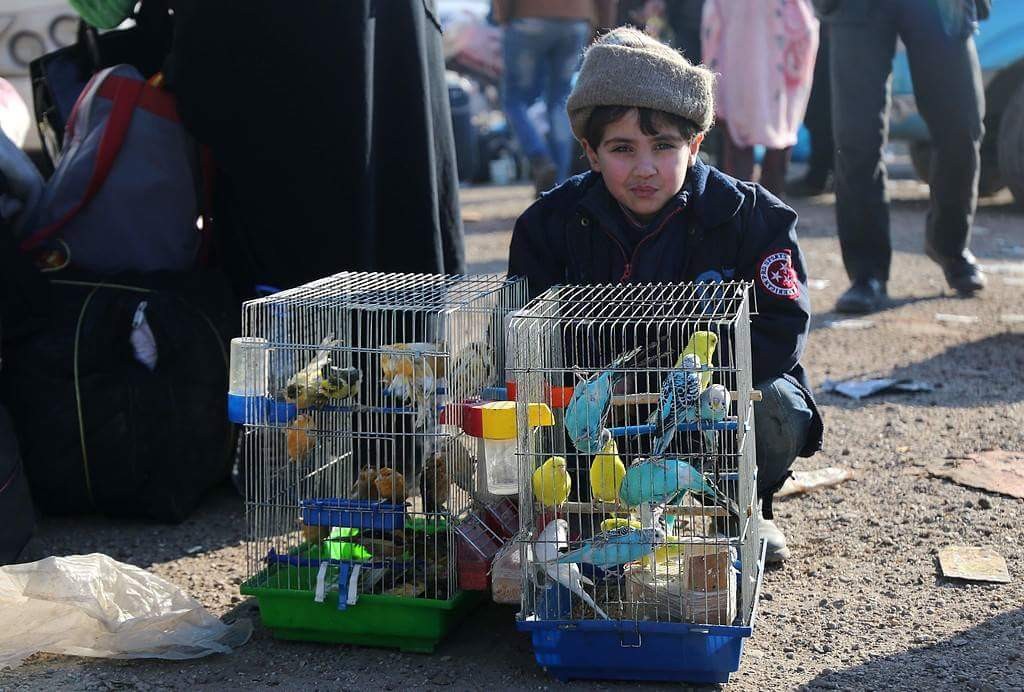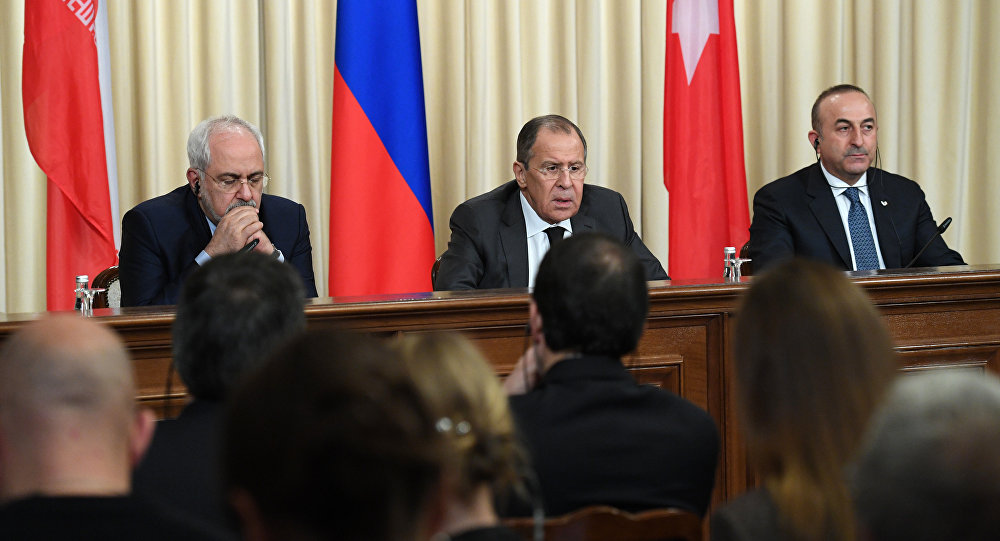PHOTO: Iran’s Mohammad Javad Zarif, Russia’s Sergei Lavrov, and Turkey’s Mevlut Cavusoglu on Tuesday
LATEST:
WEDNESDAY FEATURE
Analysis: The Deception of a Pro-Assad Activist at the UN
1445 GMT: Convoys are moving again — 20 buses with about 1,000 passengers from eastern Aleppo city are en route to western Aleppo Province, and four buses from two regime enclaves in Idlib Province are now in Aleppo.
UPDATE: Evacuations from East #Aleppo, Foua & Kefraya have resumed. @SYRedCrescent with our team are doing everything they can to assist.
— ICRC Syria (@ICRC_sy) December 21, 2016
UPDATE 1315 GMT: Removals have held been held up again, with a delay of more than 24 hours, for unknown reasons.
Up to 5,000 people are still in eastern Aleppo city, and pro-opposition outlets say some have been on buses that have not moved in 30 hours.
Concern is growing for the welfare of those who are trapped, amid snow and freezing temperatures.
Journalist Bilal Abdul Kareem reports from the staging area in east Aleppo:
Fighters, their families, & civilians all continue to wait in the freezing cold & snow. No one has moved since yesterday. pic.twitter.com/q59e9xmvqG
— Bilal Abdul Kareem (@BilalKareem) December 21, 2016
A pro-rebel website played down any political cause for the suspension, saying it was due to bad weather. The site said that 11 buses with more than 500 civilians arrived late Tuesday night in western Aleppo Province, and that two buses took about 100 people this morning.
However, pro-opposition media activist Ahmad Primo said the regime side was demanding the completion of evacuations from the enclaves of al-Fu’ah and Kafraya in Idlib Province before it would allow buses out of Aleppo.
Here we are waiting civilians from Aleppo who are waiting inside buses about 30 hours until now pic.twitter.com/K1puiNUA4X
— أَحمَد Primo (@PrimoAhmad) December 21, 2016
UPDATE 0915 GMT: The prayer of some of the remaining people who await removal from eastern Aleppo city:

An estimated 3,000 to 4,000 people are still awaiting transport, as they endure temperatures below freezing point.
A boy with his birds in eastern Aleppo:

A boy who is now in western Aleppo Province says, “I brought my cat with me from #Aleppo to save it from siege, starvation, bombing, and shooting by Assad and those helping him.”
I brought my cat with me from #Aleppo to save it from siege, starvation, bombing & shooting by Assad and those helping him. #Syria pic.twitter.com/YfzEhUsC8f
— شبكة الثورة السورية (@RevolutionSyria) December 21, 2016
ORIGINAL ENTRY: The Foreign Ministers of Russia, Iran, and Turkey proclaimed on Tuesday that they will pursue a political resolution of the 69-month conflict in Syria.
In a statement after the meeting in Moscow, the trio said that, as they are “convinced that there is no military solution”, they are ready to become “guarantors of the prospective agreement, being negotiated, between the Syrian Government and the opposition”.
The statement was short on detail of how this would be achieved — for example, there is no sign at the moment of discussions between the Assad regime and opposition and rebel groups. However, it was a high-profile sign of the shift of influence among outside actors.
Before the meeting, Russian Foreign Minister Sergei Lavrov had pointedly noted the exclusion of the US, which had tried to arrange a political arrangement, alongside the Russians, since September 2013. Lavrov said that “Western countries” had disqualified themselves from involvement because of their support of “terrorism”.
Turkey’s presence in Moscow indicated that, despite its long-standing support of the Syrian opposition and rebels, that it was happy to put the US aside. It also highlighted the willingness to work with Iran and Russia, the essential backers of the Assad regime since the uprising began in March 2011.
Tuesday’s statement “invited all other countries with the influence on the situation on the ground” to also guarantee a prospective agreement. However, that clause appeared to be directed at Saudi Arabia, a major backer of the opposition and rebels.
Lavrov, Turkish Foreign Minister Mevlut Cavusoglu, and Iranian counterpart Mohammad Javad Zarif welcomed the removal of tens of thousands of civilians and thousands of rebels from eastern Aleppo city — despite the months-long blocking by Russia of a ceasefire as Moscow and Tehran led the efforts to break the resistance in the area.
The three said they would “ensure the completion of the process without interruption and in a safe and secure manner”: a sign that Iran, which twice undermined the removals last week, was now satisfied with the process.
The Ministers also supported the parallel removals of people from the regime enclaves of al-Fu’ah and Kafraya in Idlib Province and the opposition towns of Madaya and Zabadani in Damascus Province.
They then envisaged talks between the Assad regime and the opposition, to be held in Kazakhstan.
The Ministers did not address likely issues that could soon challenge their new alliance. Senior Iranian officials have objected to a UN Security Council plan for international monitors in Aleppo, even though Russia worked with France to get a resolution that was unanimously adopted.
Nor was there any reference to whether the opposition and rebels would be allowed to remain in control of Idlib Province in northwest Syria, despite the Assad regime’s wish to crush any resistance. Iran has indicated that it will support further military operations, but Russia has not revealed its position and Turkey, which borders Idlib, would have to withdraw their support for the opposition-rebel presence.
The three ministers also did not mention the de facto partition of northern Syria, with a Turkish-rebel alliance having taken parts of Aleppo Province even as the Russian-Iranian-regime assault was reoccupying all of Aleppo city.
US: “We Are Not Being Sidelined”
State Department spokesman John Kirby insisted that Washington had not been sidelined:
The Secretary doesn’t see this as a snub at all. He sees it as another multilateral effort to try to get a lasting peace in Syria and he welcomes any progress towards that.
We would obviously refute any notion that…the fact that we weren’t at this one meeting is somehow a harbinger or a litmus test for U.S. influence and leadership there or anywhere else around the world.
We are not excluded, we are not being sidelined.
However, another US official acknowledged:
The fact is that we have put ourselves in a position where Russia is making efforts to try to work with anybody else so they can isolate us.
We let our differences with Turkey over the Kurds and our views over the northern part of Syria create gaps that the Russians have exploited.
The Russian Foreign Ministry did give Washington a crumb of comfort with the statement that Foreign Minister Lavrov and US Secretary of State Kerry, in a phone call, had discussed restarting negotiations between the Assad regime and opposition.
The Ministry said that Lavrov “informed the US Secretary of State on the results of the Moscow meeting”:
They discussed ways of ending the conflict in Syria, including the issues of final normalization of the situation in eastern neighborhoods of Aleppo, where a voluntary evacuation of civilians and withdrawal of gunmen is ending, as well as restart of the intra-Syrian negotiating process without setting preconditions, on which the patronized-by-the-West opposition insisted earlier.
ISIS Pushes Back Turkish-Rebel Attack on al-Bab
[UPDATE 1725 GMT: The Islamic State has repelled the Turkish-rebel attacks near al-Bab, regaining Sheikh Aqil Hill and the National Hospital.]
Turkey has claimed an advance in the Turkish-rebel offensive on al-Bab, the Islamic State’s last major position in Aleppo Province.
The Turkish military said Wedenesday that the Free Syrian Army, supported by Ankara’s ground forces, have gained full control of the highway between al-Bab and Aleppo city.
The military said four Turkish soldiers were killed and 15 were injured in the operations. It added that Turkish airstrikes had killed more than 45 ISIS fighters and “destroyed 47 shelters”.
The statement said fighters is ongoing near a hospital, claiming it is used by ISIS as a shelter and ammunition depot.
The offensive began a month ago to take al-Bab, northeast of Aleppo city. Its capture would further confirm a Turkish-rebel zone through much of Aleppo Province, as Russia and Iran help the Assad regime reoccupy all of Aleppo city.

